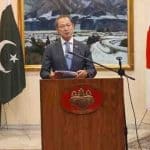ISLAMABAD, Sep 09 : Participants at a seminar on “Leveraging Indigenous Coal Resources for Sustainable Energy in Pakistan” held here Monday highlighted the critical need to transition from imported coal to indigenous Thar coal for a more secure and economically viable energy future.
The seminar was arranged by the US-Pakistan Centre for Advanced Studies in Energy (USPCAS-E), NUST.
The seminar delved into the findings of a recently published whitepaper by USPCAS-E, titled ‘Transition from Imported to Local Coal to Attain Energy Security in Pakistan: Opportunities & Challenges.’
The document called for a strategic shift from imported coal to indigenous Thar coal to strengthen Pakistan’s energy security and alleviate the financial burden of coal imports.
It highlighted that Pakistan has substantial coal resources, estimated at over 185 billion tonnes, with the majority located in Sindh’s Thar region.
These reserves could generate 100,000 MW of electricity for over 200 years, significantly reducing the need for costly imports.
The event hosted leading energy experts who discussed the strategic importance of Thar coal in reducing Pakistan’s reliance on imported fuel and securing the nation’s energy future.
Key discussions focused on global trends in power production, Pakistan’s current energy mix, and the challenges and opportunities associated with utilising local coal resources.
Dr Adeel Waqas, Principal USPCAS-E, NUST, delivered the welcome address followed by comprehensive discussions moderated by Dr Majid Ali from USPCAS-E.
Said Ali Nawaz, DG Coal at PPIB, remarked, “We have imported coal worth $6 billion in the last 3 to 4 years. Thar truly is a game changer for our economy. In the next five years, we could fully reap the benefits as baseload shifts to Thar coal. This will reduce electricity prices and have an overall impact of PKR 2 to 3 on the basket price through the conversion of three imported coal plants.” Shahab Qader Khan, CSO KE, said that Thar coal is at a takeoff stage and would eventually prove highly beneficial. This would also help generate employment and foster sustainable development.
“Ultimately, if local coal can generate cheap electricity, it is in the national interest and should be prioritised,” said Salman Nazir, Head of Projects and Business Development, Renewable Resources (Pvt) Ltd. “If Thar coal can be supplied to the cement industry, its utilisation will increase, optimising high energy costs,” said Farrukh Ahmed, Head of Sustainability, Bestway.
The seminar drew to a close with a call to action, highlighting the necessity for a collaborative effort among the government, industry, and academia to effectively harness Pakistan’s indigenous coal resources.
Follow the PNI Facebook page for the latest news and updates.









